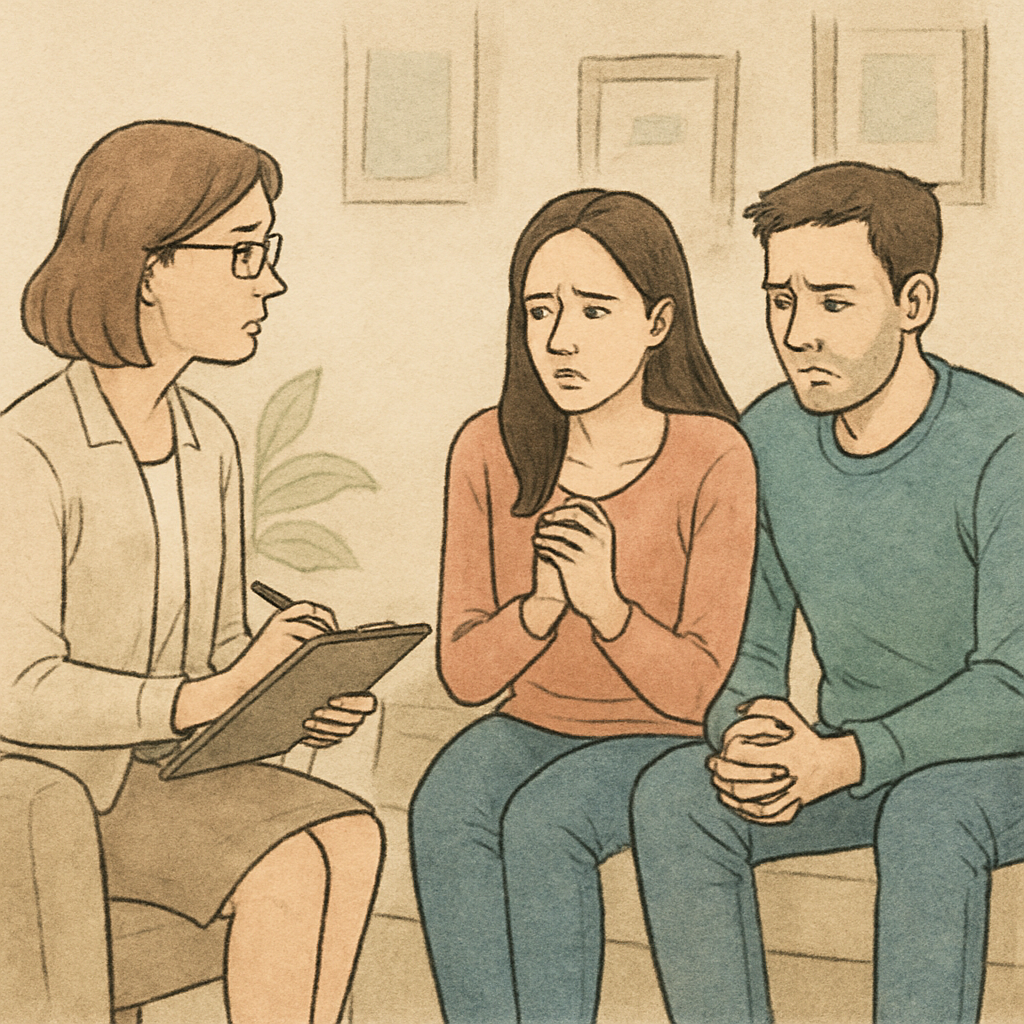September 2, 2025
Find the right therapist for relationship anxiety with essential tips and insights for healthier connections
Navigating relationship anxiety can be challenging. It often involves fear, trust issues, or constant worry about the future.
Finding the right therapist is crucial for managing these feelings. A skilled therapist can help individuals and couples communicate better and resolve conflicts.
Therapists for relationship anxiety specialize in guiding people through these emotional hurdles. They create a safe space for partners to express their feelings without judgment.
Choosing the right therapist involves checking credentials and ensuring they have experience with relationship issues. Initial consultations can help determine if they are a good fit.
This guide will provide insights and tips for finding the right therapist to help you build healthier relationships.
Relationship anxiety often manifests in subtle ways. It's not always easy to identify. It includes fears of abandonment or doubts about your partner's commitment.
Different factors contribute to relationship anxiety. Past experiences, personality traits, or family dynamics can all play a role. Understanding these factors can help in addressing the anxiety effectively.
There are common responses to relationship anxiety:
Recognizing these signs is the first step to managing anxiety. Acknowledging its presence opens the door to healing and growth.

It's vital to address these feelings in a supportive environment. This is where professional therapy becomes invaluable. A therapist can guide you toward healthier relationship dynamics.
Relationship anxiety can present itself in various ways. Often, it involves overthinking or constant worrying. You might anticipate problems that aren't there.
Several causes can contribute to this anxiety. Unresolved past relationship issues may resurface in new partnerships. Low self-esteem can exacerbate these feelings, leading to doubt and insecurity.
Common signs of relationship anxiety include:
Understanding these signs and their origins is crucial. Recognizing causes helps in managing and reducing anxiety. By addressing both signs and causes, you can take steps toward healthier relationships. Professional guidance can help navigate these complex emotions.
Therapists play a pivotal role in addressing relationship anxiety. They provide a space for partners to express their worries without judgment. This safe environment is crucial for effective communication.
Therapists use various techniques tailored to each couple’s needs. With experience in anxiety, they can identify patterns and triggers. These insights guide the treatment plan.
Here are some ways therapists can assist:
Sessions focus on personal and relational growth. They encourage individuals to explore underlying fears. Addressing these issues enhances emotional connection and relationship strength.
Through therapy, couples can rebuild trust and foster healthier interactions. Consistent sessions pave the way for lasting change and deeper bonds.
There are several therapy approaches available to tackle relationship anxiety. Each method offers unique benefits. The choice depends on individual preferences and needs.
Common types of therapy include:
CBT aims to identify and alter destructive thoughts. It is effective for reducing anxiety symptoms. EFT, on the other hand, centers on improving emotional connection.
Therapists may suggest trying a combination of these methods. This mix caters to both emotional and cognitive aspects of anxiety. Personalized therapy enhances the likelihood of success in overcoming relationship challenges.
Choosing the right therapist for couples is vital for effective counseling. A therapist with specific expertise in relationship issues can make a significant difference.
Here are some traits to consider when selecting a therapist:
It’s essential to find someone who fosters a safe and non-judgmental environment. This atmosphere encourages open communication between partners.
by Double e (https://unsplash.com/@conroyee)
Initial consultations offer a chance to gauge comfort and compatibility. It's often a chance to ask about techniques and session goals. Your comfort with the therapist can greatly influence therapy's effectiveness.
Managing anxiety within a relationship requires patience and practice. Effective communication is a cornerstone for any healthy partnership.
Here are some counseling tips to consider:
Practicing active listening can dramatically reduce misunderstandings. When individuals feel heard, anxiety levels often decrease.
Therapists often recommend mindfulness exercises to help couples stay present. This practice enhances trust and connection between partners.
Implementing these strategies can improve relationship satisfaction over time. Couple's commitment to these practices is key to managing anxiety effectively.
Finding the right therapist for relationship anxiety involves several steps. Start by identifying your specific needs and therapy goals.
Consider these factors when searching for a therapist:
Online platforms can make the search easier. Reading reviews and seeking recommendations can also guide you to a suitable therapist.
Initial consultations are crucial. They provide an opportunity to assess if the therapist's approach aligns with your needs.
by jurien huggins (https://unsplash.com/@jurienh)
Starting therapy can feel daunting. However, knowing what to expect can ease initial anxieties.
Therapy sessions often include:
Remember, results take time. Patience and honest communication with your therapist can significantly improve the experience.
Therapy offers valuable tools to build stronger, more fulfilling relationships. By addressing relationship anxiety, couples gain insights into themselves and each other.
The right therapist can guide you toward healthier communication and deeper connections. With time and effort, therapy can transform anxieties into opportunities for growth.

We're now accepting new patients
